






Edris Wedi is MD and a leading specialist in gastroenterology and gastrointestinal oncology.
He holds the position of Head of the Department of Gastroenterology, Gastrointestinal Oncology and Interventional Endoscopy at Sana Clinic Offenbach.
Specialization:
Education and Experience:
Dr. Wedi is actively involved in international medical organizations:
Physician Specialties:
Professional experience and education:
Scientific activities include:
Membership in international medical organizations:
Doctor of Medical Sciences.
Head of the Colorectal Cancer Center and Chief Physician of the Clinic of General, Visceral and Thoracic Surgery at the Helios Hospital Bad Zarow.
The doctor specializes in general surgery, abdominal (visceral) surgery and thoracic surgery (thoracic surgery).
He actively participates in scientific conferences and has authored scientific articles published in international publications.
Expert in internal medicine with specialization in gastroenterology, oncology and diabetology.
Specialization:
Education and experience:
He actively participates in scientific conferences, publishes articles in journals and teaches at the Medical University.
Membership in professional organizations:

















Check the cost of treatment and get 20 000 € from international foundation
Get financial help up to 20 000 € for your child treatment
Medical consultant
Turkish oncologist will provide an individual chemotherapy program.
Israeli oncologist will provide an individual chemotherapy program.
Spanish oncologist will provide an individual chemotherapy program.
German oncologist will prepare an individual chemotherapy program.
Polish oncologist will prepare an individual chemotherapy program.
Italian oncologist will prepare an individual chemotherapy program.
Turkish radiologist will prepare a personalized radiation therapy program
Israeli radiologist will draw up an individual radiation therapy program.
German radiologist will draw up an individual radiation therapy program.
Spanish radiologist will draw up an individual radiation therapy program.
Polish radiologist will prepare an individual radiation therapy program.
Italian radiologist will draw up an individual radiation therapy program.
Turkish plastic surgeon will make an individual operation program.
German plastic surgeon will make an individual operation program.
Israeli plastic surgeon will make an individual operation program.
Italian plastic surgeon will make an individual operation program.
Polish plastic surgeon will make an individual operation program.
Spanish plastic surgeon will make an individual operation program.
Turkish orthopedic surgeon will make an individual operation program.
Israeli orthopedic surgeon will make an individual operation program.
German orthopedic surgeon will make an individual operation program.
Italian orthopedic surgeon will make an individual operation program.
Lithuanian orthopedic surgeon will make an individual operation program.
Polish orthopedic surgeon will make an individual operation program.
Ukrainian orthopedic surgeon will make an individual operation program.
Spanish orthopedic surgeon will make an individual operation program.
Turkish neurosurgeon will study the medical situation and give recommendations for treatment.
Israeli neurosurgeon will study the medical situation and give recommendations for treatment.
German neurosurgeon will study the medical situation and give recommendations for treatment.
Italian neurosurgeon will study the medical situation and give recommendations for treatment.
Lithuanian neurosurgeon will study the medical situation and give recommendations for treatment.
Spanish neurosurgeon will study the medical situation and give recommendations for treatment.
Ukrainian neurosurgeon will study the medical situation and give recommendations for treatment.
Turksih doctor will answer your questions
Israeli doctor will answer your questions
German doctor will answer your questions
Italian doctor will answer your questions
Polish doctor will answer your questions
Ukrainian doctor will answer your questions
Spanish doctor will answer your questions
Israeli orthopedic surgeon prepare an individual surgical plan and recomendations
Turkish orthopedic surgeon prepare an individual surgical plan and recomendations
German orthopedic surgeon prepare an individual surgical plan and recomendations
Italian orthopedic surgeon prepare an individual surgical plan and recomendations
Lithuanian orthopedic surgeon prepare an individual surgical plan and recomendations
Polish orthopedic surgeon prepare an individual surgical plan and recomendations
Spanish orthopedic surgeon prepare an individual surgical plan and recomendations
Lithuanian doctor will answer your questions
After examining your situation, doctor will make an individual price offer.
Doctor-consultant will answer all your questions about the cost of treatment, the choice of a doctor and fully organize treatment abroad.

we will contact you within 15 minutes
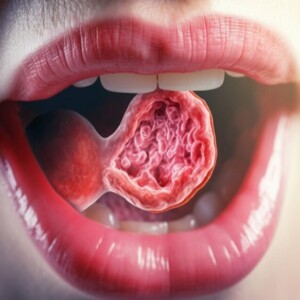 German oncologists, especially ENT surgeons, give preference to organ-preserving operations. Therefore, scientists have developed such methods of therapy for tongue cancer, which allow you to fight the disease effectively. But, as with any malignant tumor, it is not yet possible to completely rule out surgery. For this purpose, protocols for the treatment of tongue cancer in Germany include gentle surgical techniques that allow you to eliminate neoplasms without radical removal of the organ.
German oncologists, especially ENT surgeons, give preference to organ-preserving operations. Therefore, scientists have developed such methods of therapy for tongue cancer, which allow you to fight the disease effectively. But, as with any malignant tumor, it is not yet possible to completely rule out surgery. For this purpose, protocols for the treatment of tongue cancer in Germany include gentle surgical techniques that allow you to eliminate neoplasms without radical removal of the organ.
After a thorough diagnosis, the oncologist will be able to determine the tactics of tongue cancer treatment in Germany. Depending on the stage of the disease, age and condition of the patient, a combination of therapies and surgery will be chosen.
To diagnose tongue cancer in European clinics, various methods of research are used. Among the main ones are:
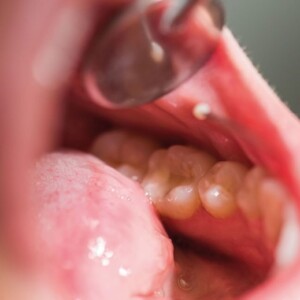 Visual inspection and palpation. The doctor checks the patient’s oral cavity, palpates the tongue and surrounding tissues.
Visual inspection and palpation. The doctor checks the patient’s oral cavity, palpates the tongue and surrounding tissues.Such examinations allow German oncologists to diagnose tongue cancer with high accuracy and develop the most effective treatment plan.
Oncologists at leading clinics often use molecular genetic tests for diagnosis. They help to determine the most effective methods of tongue cancer treatment in Germany for each specific case. The most advanced medical centers use the latest technologies, such as “liquid biopsy” analysis for early detection and disease monitoring.
Germany, which is one of the world leaders in oncology and ENT surgery, uses advanced surgical treatment methods. Most of them are aimed at maximizing the preservation of tongue function.
The use of low temperatures to destroy atypical cells while minimizing damage to healthy tissue.
This method removes small tumors with minimal damage to surrounding tissues, allowing the patient to avoid losing speech.
Using robotic instruments, the surgeon can precisely remove tumors while minimizing trauma to surrounding tissues and structures responsible for speech.
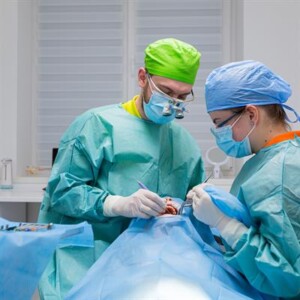 Partial glossectomy
Partial glossectomyRemoval of only the affected part of the tongue, rather than the entire organ. This increases the chance that the patient will be able to speak in the future.
A complete glossectomy is a surgery that is a last resort. It is performed when the tongue cancer has reached an advanced stage and other treatment methods do not bring the desired effect. Such an operation is necessary if the tumor has spread to a large part of the tongue or affects its root, making it impossible to save the organ without risking the patient’s life.
After large tumors are removed, tissue from other parts of the body is used to reconstruct the tongue. This gives the patient a chance to preserve the function of the tongue.
Cancer centers in Germany practice a multimodal approach, combining surgery with radiation and chemotherapy to achieve the best results. Rehabilitation also plays an important role, including speech therapy to restore speech after surgery.
Modern chemotherapy for the comprehensive treatment of tongue cancer differs significantly from standard chemotherapy. The key difference lies in the individualization of the approach and the use of targeted drugs. If a tumor is present, chemotherapy treatment will depend on the specific medical case.
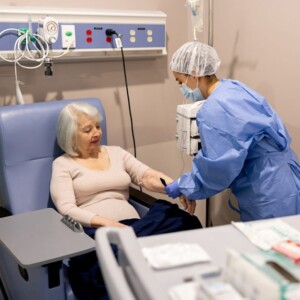 Neoadjuvant chemotherapy
Neoadjuvant chemotherapyIt is used before surgery to reduce the size of the tumor. It can make surgery less invasive and save more tongue tissue.
Used after surgery to kill remaining cancer cells, which reduces the risk of recurrence.
A combination of chemotherapy and radiation therapy. Chemoradiation is often used to treat advanced stages of tongue cancer.
This technique is used at stage 4 of tongue cancer (in the presence of complicating circumstances) when the goal is to improve the quality of life, not a complete cure.
For early stages of the disease, neoadjuvant chemotherapy and surgery are often sufficient. For advanced forms of tongue cancer, adjuvant chemotherapy and chemoradiation may be necessary.
In Germany, these methods make modern chemotherapy more effective and less toxic, which is especially important for preserving a person’s quality of life.
Modern radiation therapy for tongue cancer treatment in Germany offers advanced techniques and technologies. They significantly increase the effectiveness of treatment and reduce side effects.
IMRT allows you to target the tumor with high precision, minimizing the impact on surrounding healthy tissue. This is especially important to preserve the patient’s speech function and quality of life.
This method uses regular medical images to correct the patient’s position and precisely target the rays to the neoplasm in real time.
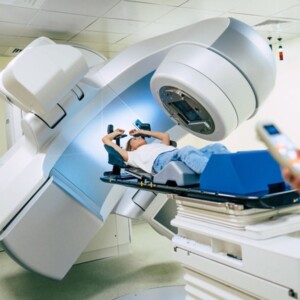 Stereotactic surgery
Stereotactic surgeryUsed to treat small, hard-to-reach or difficult-to-locate tumors. This method delivers a high dose of radiation in a short time period.
In Germany, advanced machines such as the Varian TrueBeam, CyberKnife and ProBeam (proton therapy system) are used for these procedures. This equipment provides high precision and the possibility of applying various methods of radiation therapy. These are new generation devices that show good results in the treatment of patients of all age groups.
Treatment of tongue cancer in Germany, according to the reviews of people who underwent radiation therapy, increased the chances of full recovery. Patients have not noted severe side effects, which confirms the safety of such technologies.
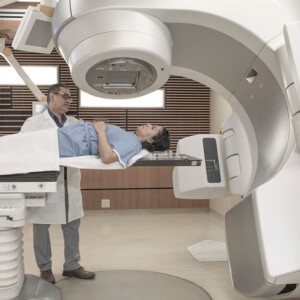 3D-CRT is three-dimensional conformal radiotherapy (a variant of radiation therapy). The technology uses special computers to precisely map the location of the tumor. Multiple radiation beams are then formed and directed at the tumor from different angles, reducing the chance of damage to normal tissue.
3D-CRT is three-dimensional conformal radiotherapy (a variant of radiation therapy). The technology uses special computers to precisely map the location of the tumor. Multiple radiation beams are then formed and directed at the tumor from different angles, reducing the chance of damage to normal tissue.
The effectiveness of radiotherapy in treating tongue cancer depends on many factors, including the stage of the disease, the patient’s overall condition, and the presence or absence of metastases.
In the early stages of tongue cancer, radiotherapy can be used as a stand-alone treatment method. Efficacy reaches 80-90% successful outcomes. In later stages, radiotherapy is often combined with chemotherapy and surgery to improve outcomes. In these cases, efficacy can vary, but the combined approach significantly increases the chances of successful treatment.
Modern radiation therapy options, such as IMRT and stereotactic radiosurgery, allow the beams to be directed more precisely, reducing side effects. This is especially important in the treatment of tongue cancer, where the ability to speak and swallow food normally is a priority.
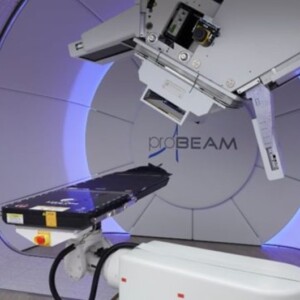 Proton therapy is an advanced method of radiation therapy that is actively used in Germany to treat a variety of cancers, including tongue cancer. This method differs from traditional photon radiotherapy in that it uses protons instead of photons. Protons have mass and charge, which allows the beams to be more precisely targeted at the tumor, minimizing damage to surrounding healthy tissue.
Proton therapy is an advanced method of radiation therapy that is actively used in Germany to treat a variety of cancers, including tongue cancer. This method differs from traditional photon radiotherapy in that it uses protons instead of photons. Protons have mass and charge, which allows the beams to be more precisely targeted at the tumor, minimizing damage to surrounding healthy tissue.
Germany uses high-tech proton therapy facilities such as gantry systems and scanning knives. This ensures high precision and the ability to treat complex and hard-to-reach tumors.
Application of proton therapy depending on the stage of tongue cancer
Proton therapy can be used at different stages of tongue cancer. At stages 1-2 it can be used as a stand-alone treatment method. At later stages (3-4), it can be used in combination with surgery and chemotherapy.
Proton therapy is available in only a few clinics in the world. Germany is one of the countries where patients can receive proton therapy treatment. This medical service is not available in countries popular for medical tourism, such as Turkey and Israel.
One of the global proton therapy centers is located in Essen. The WPE clinic accepts patients of all ages. But a precise medical decision is required for the application of this unique technology. A consultation about undergoing proton therapy for the treatment of tongue cancer is available through Experts Medical coordinators.
German medical centers are actively developing oncological science. Therefore, the country uses unique tongue cancer therapies that are rarely found in other countries. Here are some of them:
These methods make Germany one of the leaders in the field of oncology, and many patients from different countries come here to treat tongue and oropharyngeal cancer.
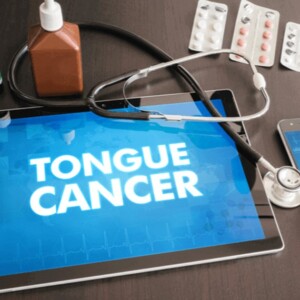 In 2023, innovative techniques have emerged in the field of tongue cancer treatment that go far beyond traditional chemotherapy and radiation therapy. One such technique is “spot oncology,” which studies the genetic makeup and molecular characteristics of tumors in each patient individually. This approach allows for more accurate and effective treatment plans.
In 2023, innovative techniques have emerged in the field of tongue cancer treatment that go far beyond traditional chemotherapy and radiation therapy. One such technique is “spot oncology,” which studies the genetic makeup and molecular characteristics of tumors in each patient individually. This approach allows for more accurate and effective treatment plans.
In addition, research in HPV-associated cancers of the mouth and throat shows that new, shorter courses of treatment provide stable control of the disease. It has fewer side effects compared to standard methods.
In modern oncology, the use of anatomical modeling and 3D printing has led to advances in surgical techniques for the treatment of oral tumors, including tongue cancer.
These techniques are of great value to patients as they increase the chances of successful treatment and reduce the risk of complications. This approach is important for preserving patients’ quality of life.
People looking for tongue cancer treatment options in Germany indicate in testimonials that they would like to try innovative therapy options. They are willing to participate in testing new types of drugs. Some German medical centers offer this opportunity to foreign patients. To learn more, leave an application on the Experts Medical website. You will receive a consultation with a coordinating physician and options for modern tongue cancer treatment in Germany.
 Tongue cancer treatment in Germany follows modern protocols. Oncologists take into account medical achievements in this field and promptly implement them in their clinics.
Tongue cancer treatment in Germany follows modern protocols. Oncologists take into account medical achievements in this field and promptly implement them in their clinics.
Detailed diagnostics is an integral part of choosing the most effective treatment for tongue cancer in Germany. It is possible to get an absentee second opinion from an oncologist remotely at a cost of approximately $350-700. If the online consultation reveals that the examinations were performed correctly, the patient can save money on further tests. Diagnosis on a modern PET-CT machine will cost from $2100. This is necessary to detect metastases and correct therapy.
Treatment of tongue cancer in Germany with CyberKnife will cost from $9000 per course.
The cost of surgical treatment of tongue cancer in Germany will depend on the type of surgery and the length of stay in the hospital.
Modern immunotherapy for the treatment of tongue cancer in Germany at advanced stages can cost up to $60,000. Technologies that involve special tests, selection of the drug or its customization for the patient – have a higher price than chemotherapy. However, it may be the only chance to achieve a long remission and alleviate the patient’s general condition.
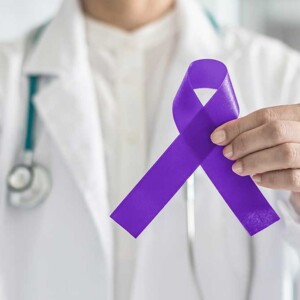 Experts Medical coordinators have organized tongue cancer treatment in Germany for hundreds of foreign patients from different parts of the world. Most often people underwent diagnostics and therapy in leading hospitals: University Hospital Dusseldorf, Nordwest, Charite and others.
Experts Medical coordinators have organized tongue cancer treatment in Germany for hundreds of foreign patients from different parts of the world. Most often people underwent diagnostics and therapy in leading hospitals: University Hospital Dusseldorf, Nordwest, Charite and others.
What people most often noted in their reviews about tongue cancer treatment in Germany:
You can read more reviews about tongue cancer treatment in Germany on the Experts Medical website.
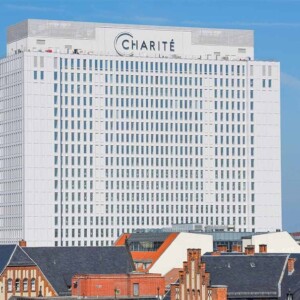 Experts Medical cooperates directly with renowned clinics around the world. Therefore, you can entrust any organizational issues to the company’s coordinating doctors, who will be able to send the patient for language cancer treatment in Germany.
Experts Medical cooperates directly with renowned clinics around the world. Therefore, you can entrust any organizational issues to the company’s coordinating doctors, who will be able to send the patient for language cancer treatment in Germany.
For what questions is it advisable to contact Experts Medical?
If you need a consultation with a professor for further tongue cancer treatment in Germany, leave a request on this page. A medical coordinator will contact you and arrange a free online meeting with a specialist.
When you have decided on the oncologist and clinic, the coordinator will send your medical documents to the hospital. You will receive a more detailed plan of language cancer treatment in Germany with prices for procedures and conditions of stay.
Experts Medical can help you book accommodation in Berlin, Essen or Frankfurt am Main for the whole period of diagnosis and therapy. If necessary, Experts Medical will always be available for any questions while you or your loved one is undergoing tongue cancer treatment in Germany.